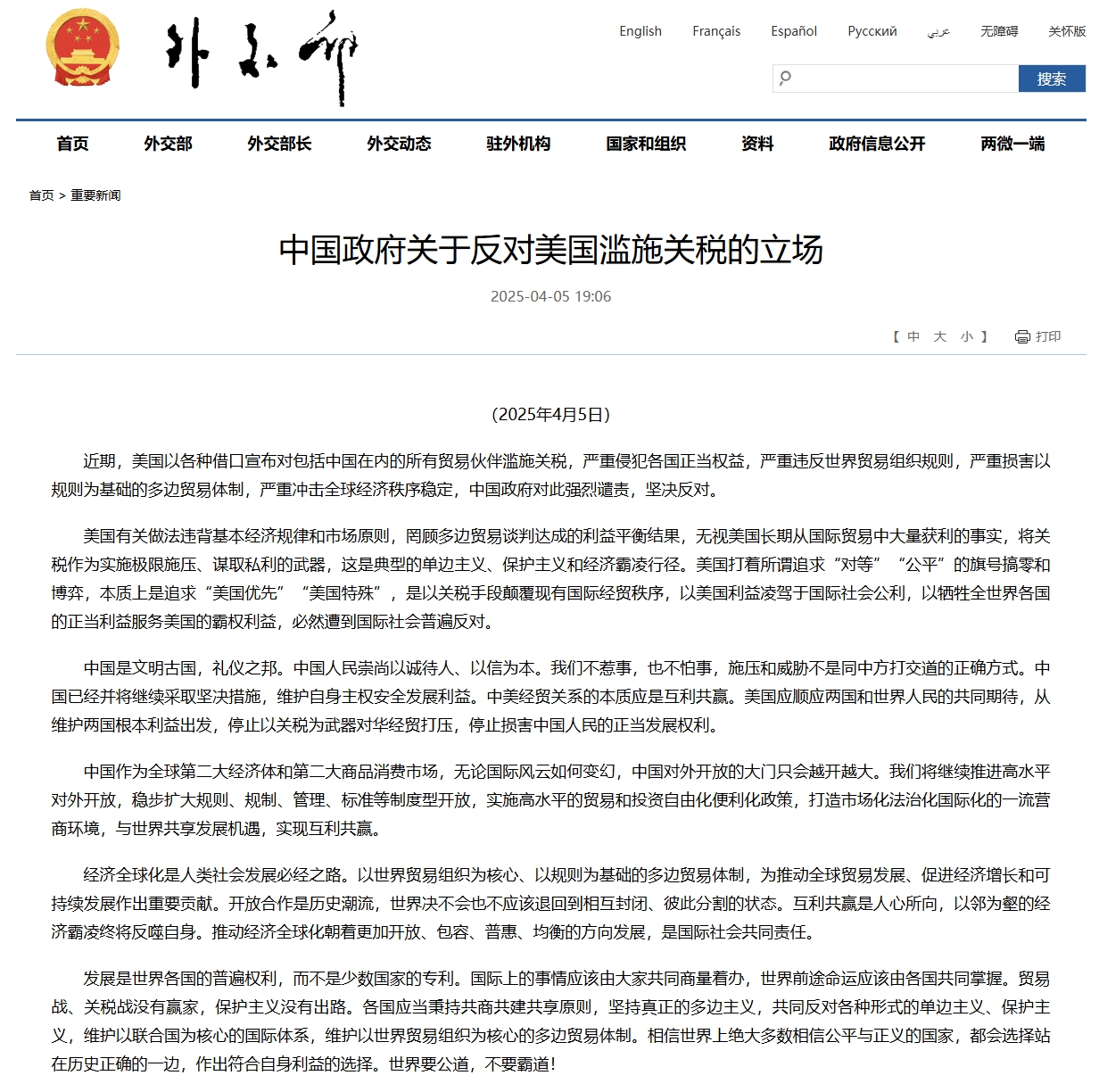
The Chinese Government’s Position on Opposing the United States’ Abusive Imposition of Tariffs
Translation of the Chinese Government Statement (April 5, 2025)
The Chinese Government’s Position on Opposing the United States’ Abusive Imposition of Tariffs
(Released on April 5, 2025)
Recently, the United States has announced the abusive imposition of tariffs on all trading partners, including China, under various pretexts. These actions severely violate the legitimate rights and interests of nations, contravene World Trade Organization (WTO) rules, undermine the rules-based multilateral trading system, and destabilize the global economic order. The Chinese government hereby expresses its strong condemnation and resolute opposition.
The U.S. practices disregard fundamental economic principles and market rules, ignore the balanced outcomes achieved through multilateral trade negotiations, and overlook the fact that the United States has long reaped substantial benefits from international trade. By weaponizing tariffs to exert maximum pressure and pursue selfish gains, the U.S. is engaging in typical unilateralism, protectionism, and economic bullying. Under the guise of so-called “reciprocity” and “fairness,” the U.S. is pushing a zero-sum game that essentially prioritizes “America First” and “American exceptionalism.” It seeks to subvert the existing international economic and trade order, elevate U.S. interests above the common good of the international community, and sacrifice the legitimate interests of all nations to serve U.S. hegemonic ambitions. Such actions will inevitably face widespread opposition from the global community.
China is a civilization with a long history and a nation that values etiquette. The Chinese people uphold sincerity and trustworthiness. We do not provoke trouble, nor do we fear it. Pressure and threats are not the right way to engage with China. China has already taken, and will continue to take, firm measures to safeguard its sovereignty, security, and developmental interests. The essence of China-U.S. economic and trade relations should be mutual benefit and win-win cooperation. The United States must heed the shared aspirations of both nations and the world, prioritize the fundamental interests of both countries, cease using tariffs as a weapon to suppress China’s economic development, and stop infringing on the Chinese people’s legitimate right to development.
As the world’s second-largest economy and second-largest consumer goods market, China’s commitment to opening up will only deepen, regardless of shifting global dynamics. We will continue to advance high-standard opening-up, steadily expand institutional openness in rules, regulations, management, and standards, implement high-level trade and investment liberalization and facilitation policies, and cultivate a world-class business environment governed by market principles, the rule of law, and international norms. China is committed to sharing development opportunities with the world and achieving mutual prosperity.
Economic globalization is an inevitable path for human societal progress. The WTO-centered, rules-based multilateral trading system has made significant contributions to advancing global trade, promoting economic growth, and fostering sustainable development. Open cooperation is the tide of history; the world must not and should not regress into isolation and fragmentation. Mutual benefit and win-win outcomes reflect the will of the people, while economic bullying rooted in a “beggar-thy-neighbor” mindset will ultimately backfire. It is the shared responsibility of the international community to steer economic globalization toward greater openness, inclusiveness, and balanced development.
Development is a universal right of all nations, not the privilege of a select few. Global affairs should be decided through collective consultation, and the future of the world must be shaped jointly by all countries. Trade wars and tariff battles have no winners; protectionism offers no way forward. All nations should uphold the principles of extensive consultation, joint contribution, and shared benefits, adhere to true multilateralism, oppose all forms of unilateralism and protectionism, safeguard the UN-centered international system, and preserve the WTO-centered multilateral trading regime. We are confident that the overwhelming majority of nations that believe in fairness and justice will stand on the right side of history and make choices aligned with their own interests. The world needs justice, not hegemony!
(Xinhua News Agency, Beijing, April 5)
Key Contextual References:
- Terminology alignment with China’s official statements on unilateralism and WTO rules .
- Retaliatory measures (e.g., 34% tariffs) and rare earth export controls as outlined in Chinese policy responses .
- Emphasis on multilateralism and global economic stability from China’s trade policy framework .


